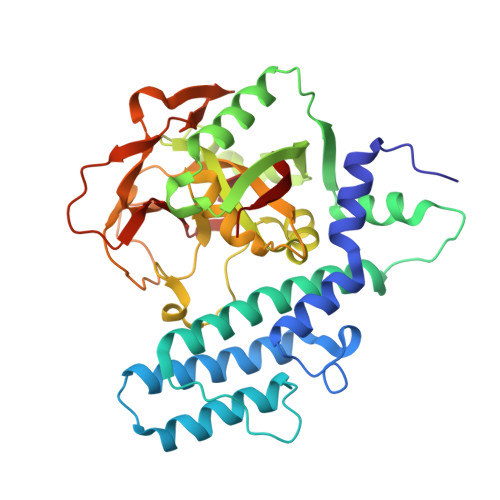Dissecting the molecular determinants of clinical PARP1 inhibitor selectivity for tankyrase1.
Ryan, K., Bolanos, B., Smith, M., Palde, P.B., Cuenca, P.D., VanArsdale, T.L., Niessen, S., Zhang, L., Behenna, D., Ornelas, M.A., Tran, K.T., Kaiser, S., Lum, L., Stewart, A., Gajiwala, K.S.(2021) J Biol Chem 296: 100251-100251
- PubMed: 33361107
- DOI: https://doi.org/10.1074/jbc.RA120.016573
- Primary Citation of Related Structures:
7KK2, 7KK3, 7KK4, 7KK5, 7KK6, 7KKM, 7KKN, 7KKO, 7KKP, 7KKQ - PubMed Abstract:
Poly-ADP-ribosyltransferases play a critical role in DNA repair and cell death, and poly(ADP-ribosyl) polymerase 1 (PARP1) is a particularly important therapeutic target for the treatment of breast cancer because of its synthetic lethal relationship with breast cancer susceptibility proteins 1 and 2. Numerous PARP1 inhibitors have been developed, and their efficacy in cancer treatment is attributed to both the inhibition of enzymatic activity and their ability to trap PARP1 on to the damaged DNA, which is cytotoxic. Of the clinical PARP inhibitors, talazoparib is the most effective at trapping PARP1 on damaged DNA. Biochemically, talazoparib is also suspected to be a potent inhibitor of PARP5a/b (tankyrase1/2 [TNKS1/2]), which is an important regulator of Wnt/β-catenin pathway. Here we show using competition experiments in cell lysate that, at a clinically relevant concentration, talazoparib can potentially bind and engage TNKS1. Using surface plasmon resonance, we measured the dissociation constants of talazoparib, olaparib, niraparib, and veliparib for their interaction with PARP1 and TNKS1. The results show that talazoparib has strong affinity for PARP1 as well as uniquely strong affinity for TNKS1. Finally, we used crystallography and hydrogen deuterium exchange mass spectroscopy to dissect the molecular mechanism of differential selectivity of these PARP1 inhibitors. From these data, we conclude that subtle differences between the ligand-binding sites of PARP1 and TNKS1, differences in the electrostatic nature of the ligands, protein dynamics, and ligand conformational energetics contribute to the different pharmacology of these PARP1 inhibitors. These results will help in the design of drugs to treat Wnt/β-catenin pathway-related cancers, such as colorectal cancers.
Organizational Affiliation:
Structural Biology and Protein Science, Pfizer Worldwide Research and Development, San Diego, California, USA.
















